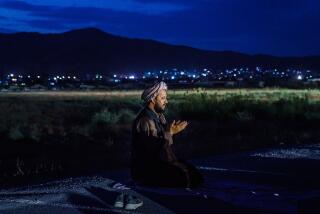Local Afghan Leaders Get a Crash Course in Governing
- Share via
KABUL, Afghanistan — Fighting may still rage in this country’s eastern reaches, but interim Prime Minister Hamid Karzai wants to get things in order--so he summoned the 32 provincial governors Sunday for their first joint meeting and mapped out a program he hopes will put war-torn Afghanistan on the road to normality.
The central government instructed each governor to immediately start working on six goals: reviving local administrations; providing security, in part by taking arms away from the public; establishing police forces; fighting drug cultivation and smuggling; rooting out pockets of Taliban and Al Qaeda resistance; and guaranteeing fundamental human and political rights.
Issuing the orders to the governors, who were appointed by Karzai in consultation with local communities, was an important step toward reestablishing central authority, said the Interior Ministry’s chief of local organizations, Mohammed Ebrahim Seleandari.
A power vacuum was created last year when the Taliban regime collapsed and its governors and other local officials fled helter-skelter, he said.
Military commanders or respected individuals emerged with the consent of the public to take control of each province. In most cases, Karzai later legitimized the people’s choice. But now he is trying to bring all the governors into line with his administration’s main goals.
‘Affection and Unity’
Although the governors are august potentates in their provinces, and in appearance are mostly imposing graybeards in long robes and turbans, they trooped into Sunday’s meeting like obedient schoolchildren holding their notebooks to receive marching orders from officials in Kabul, the capital.
“Now everybody will be going on in a unified way,” said Moulawi Ziaulhaq Haqyam, governor of Bagram province.
As he left the meeting, held at the Interior Ministry, Haqyam said the session indicated “a mood of cooperation and coordination” and showed the “affection and unity” shared by different parts of the country.
Mohammed Ebrahim Mashfeq, governor of Khowst province, said the meeting and a subsequent seminar went over the fundamentals of governing, so that the provincial leaders will devote their time to priorities and not waste effort on insignificant matters.
Mashfeq said the interim government in Kabul is legitimate in the eyes of most Afghans, “extraordinarily more than the Taliban regime was. They were fierce, while this government is the one of peace and security.”
Seleandari said the central government will be evaluating the governors from next week on to see how they are implementing the goals laid out Sunday. “If they do not apply the strategies we have defined, then there will be decisive action to replace the governors,” he said.
Disarmament a Priority
One of the most important tasks given to the governors, Seleandari said, was to ensure security by getting weapons out of the hands of individuals.
“As long as weapons such as Kalashnikovs and ammunition are with the people, there cannot be stable security,” he said.
Another task seems equally daunting: the struggle against drugs. The governors are supposed to be the first line of defense in the drug war, and they have been assigned to find ways to inspire farmers to grow crops other than opium poppies, Seleandari said. Until last year, Afghanistan was the world’s top producer of opium.
“It is the will of the interim government and the whole world community that we end this tragic and dangerous trade,” Seleandari said.
If farmers persist in growing poppies despite the government’s wishes, he said, governors are supposed to organize police and army troops to destroy the fields and search out and raze any drug storage facilities they find.
More to Read
Sign up for Essential California
The most important California stories and recommendations in your inbox every morning.
You may occasionally receive promotional content from the Los Angeles Times.













